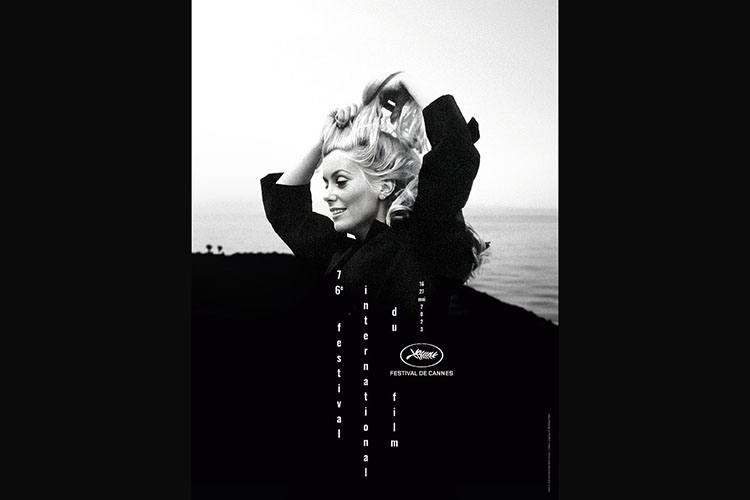The official poster of the 76th Festival de Cannes. It was created by Hartland Villa (Lionel Avignon, Stefan de Vivies) from a photo by Jack Garofalo on the set of La Chamade, a film directed by Alain Cavalier starring Catherine Deneuve, Michel Piccoli and Roger van Hool. Photo credits: Jack Garofalo/Paris Match/Scoop. Poster credits: Photo © Jack Garofalo/Paris Match/Scoop – Graphic design © Hartland Villa
Côte d’Azur, June 1, 1968.
Actress Catherine Deneuve is standing on Pampelonne beach, near Saint-Tropez, for the shooting of La Chamade by Alain Cavalier, adapted from the novel by Françoise Sagan. She plays Lucile, who leads a worldly and superficial life, tinged with ease and a taste for luxury. Her heart beats frantically, hurriedly, passionately. Like the heart of cinema that the Festival de Cannes celebrates every year: its lively and embodied pulse can be heard everywhere. The heart of the 7th Art - of its artists, professionals, amateurs, press - beats like a drum, to the rhythm of the urgency that its eternal nature imposes.
The actress of Peau d'Âne is an embodiment of cinema, far from what is conventional or appropriate. Without compromise and always in tune with her convictions, even if it means going against the grain of the times. She is the muse of Jacques Demy, Agnès Varda, Luis Buñuel, François Truffaut, Marco Ferreri, Manoel de Oliveira, André Téchiné, Emmanuelle Bercot or Arnaud Desplechin. Her collaborations are in the pantheon of immense filmmakers of yesterday and today. Catherine is the link between them all. For more than 60 years, the greatest French star has never stopped shooting, reinventing herself, experimenting, daring to do counterintuitive work or first films. An icon who has never stood still and has kept her art alive. Deneuve embodies in her very own way the richness of the cinema that the Festival wants to defend: auteur films but also quality popular films.
Four years before 1968, Catherine Deneuve illuminated Jacques Demy’s The Umbrellas of Cherbourg, which won the Palme d'or in 1964. The following year, Repulsion by Roman Polanski won the Silver Bear in Berlin. This was followed by A Matter of Resistance by Jean-Paul Rappeneau, The Young Girls of Rochefort by Jacques Demy and Luis Buñuel’s Belle de jour.
From then on, hers will be a path of glory, studded with masterpieces and commitments that will shape the portrait of a star as well as that of a woman of convictions. For Catherine Deneuve also co-signed the "Manifesto of the 343" in 1971, demanding the legalization of abortion on one hand and a collective text in 2018 in which a hundred women reject, "puritanism, denunciation and any form of expeditious justice” on the other hand.
Catherine Deneuve also starred in Indochine by Régis Wargnier, which remains, to this day, the last French winner, in 1993, of the Oscar for best international film. In 1994, she was Vice President of the Jury headed by Clint Eastwood which awarded the Palme d’or to Pulp Fiction by Quentin Tarantino. In 2000, Dancer in the Dark by Lars von Trier was the second Palme d'or in her filmography. In 2005 she received an Honorary Palme d'or and in 2008, under the presidency of Sean Penn, the Special Prize of the 61st Festival for her entire career. In 2016, Catherine Deneuve was awarded the Prix Lumière which she dedicated "to the farmers", thus taking everyone by surprise once again.
Joyful, bold-faced and romantic, a young woman with long blond hair smiles, confidently, at her future. It is a certain form of magic that Catherine Deneuve embodies - pure, incandescent and sometimes transgressive. It is this unspeakable magic that the 76th International Film Festival conveys with this timeless poster. To reiterate the glorious present of cinema and to envisage its future full of promise. Catherine Deneuve stands for what cinema should never stop being: elusive, daring, irreverent. Something self-evident: a necessity.
#cannes2023 #cannesfilmfestival #catherinedeneuve #76thcannesfilmfestival #MPJINews


